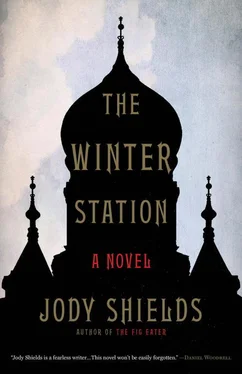“That rules out my disguise.”
The Baron had another strategy. “Stay as our guest for Easter. Li Ju would be pleased. By that time, the churches might open again for the midnight service. We’ll break our fast together, although the celebration will be less lavish this year.”
“Thank you, but I’m finished. We’ll meet again in Beijing.”
“Or Paris. In springtime.”
In St. Petersburg, the Neva River froze to a pale slate-green color, finely fractured like white moss along its thick stone banks and bridges. The Sungari was wider, wilder, its ice cloudy with yellow clay, streaks of sediment, gritty and opaque.
The Baron and Messonier had hauled the iceboat to the river and it tilted precariously on the frozen water between them, sail wrapped around the tall center pole. The Baron had reluctantly agreed to take him by boat from Kharbin to Hulan across the Sungari. His possessions would be shipped later. This was the most secure route, as there were fewer soldiers. Farther downriver, Tsingtao was ringed with barbed wire, and searchlights were set up on the wharves to catch smugglers and those fleeing quarantine.
“This is a strange farewell to Kharbin. Leaving the city like a smuggler.” The Baron squinted at his friend, relieved the harsh sunlight on his face imposed another expression over his sadness.
“I know. Forgive me.”
At faint shouting, the Baron turned into the wind, coat whipping around his legs, to peer at a long line of people walking down the snow-covered bank onto the frozen river.
Who are they? Soldiers?
They straightened the boat and prepared to launch it. The sail flapped, filled with wind, and the Baron jogged alongside and jumped in, bending his long legs under the hull. Half-reclining, the two men fit snugly inside the vessel, the canvas sail with its faint oily odor swinging over their heads. Balanced on two narrow silver runners, the boat could easily be overturned by rough ice, rocks, a branch, or a hole. The boat picked up speed, hurtling across the ice, shaking and rattling over the continuous scrape of the metal blades. Their faces were quickly numbed by cold.
In the distance, the crowd slowly fanned out over the river, a strangely measured procession with the formality of a dance as they tentatively tested the ice, maintaining a distance from one another to evenly distribute their weight. Sunlight traveled across the sheet of ice, suspending the dark figures on its suddenly brilliant surface.
The Baron turned his attention back to the boat, pulling the tiller to steer. He caught Messonier’s expression as he leaned dangerously far over the side of the boat into the raw wind, watching the unrolling blur of ice as if inviting a crash, the smashing impact of his body against it. He’d float, then submerge, his eyes becoming whitened and blank. Messonier was ready to throw himself away.
Alarmed, the Baron tugged the sail to steer back to land but wind forced another direction. The boat edged near the crowd of walkers on the ice and he noticed many of them wore masks. They were infected and had escaped quarantine. Voices shouted at them as the walkers spotted the boat. Men ran, sliding and falling, directly into their path, risking themselves to stop the boat and avoid being returned to quarantine.
The Baron quickly jerked the tiller, yelling for Messonier to hold the boom as they swerved to avoid one man and a second fell just as their prow cut past him. The Baron angled them toward an open area, racing parallel to the crowd, the sound of their blades changing as they hit rough ice.
The boat caught the edge of a branch protruding from the river, spun wildly in a circle, and skidded, hurling an arc of droplets far over the pursuing men. The impact flung the Baron and Messonier halfway out of the boat and they struggled to balance it. With an effort, the Baron clambered back inside as the boat slid to a stop. In a single wave, the scattered group of men pivoted toward the stranded boat.
There was no time to relaunch the boat, so the Baron and Messonier waited inside, as it offered some protection. The wary Chinese and Russians circled them unsteadily, surrounding the boat like swimmers. Breathing hard, coughing, the gaunt men and women grasped the sides of the boat, facing the two men. The Baron gripped the mast for support and stood up, stripped off his hat and mittens. He extended his hands, palms open, to show his helplessness. No weapons. The two strangers were no threat. Wind whipped the sail. Moments passed. The walkers released the boat and turned away.
But the iceboat was unable to sail, captive in place, as hundreds of ragged people slowly streamed past it across the river. The Baron and Messonier waited, half-dreaming, hypnotized by the endless murmuring procession, the pattern of order.
After a time, they gently pushed the boat through the thinning crowd to a clear space and steadied it between them. Messonier was silent and the Baron spoke first.
“Which direction?”
Messonier pointed over the Baron’s shoulder.
The boat entered the slipstream of movement, speeding alongside the ice walkers away from Kharbin.
The Winter Station was inspired by Baron Rozher Alexandrovich von Budberg’s memoir of the plague, Lungenpest-Epidemien in der Mandschurei, published in 1923. His book about this lost epidemic was published in Germany, likely because no Russian company dared print the Baron’s exposé about his government’s controversial conduct fighting the plague. While based on historical figures, the characters in The Winter Station are fictional, and some aspects and events of the epidemic are not present in this book. The actual plague epidemic was as complex as warfare; the accounts written by various witnesses and participants, both Russian and Chinese, were frequently entirely contradictory.
In The Winter Station, the Baron’s calligraphy lessons on pages 45, 96, 160, 248, and 266 were drawn from Creativity and Taoism by Chang Chung-yuan. The quoted lines on page 44 are from Tao of Painting by Mai-Mai Sze, and the description of brushstrokes on pages 159 and 248 are from Chinese Calligraphy and Painting, edited by Laurence Sickman. The Baron’s last words to his calligraphy teacher on page 294 and the words about grass-style calligraphy on page 191 are from A Background to Chinese Painting by Soame Jenyns. I would also like to acknowledge Hellmut Wilhelm’s magisterial Change: Eight Lectures on the I Ching . A valuable source of information about Chinese medical practice was Shigehisa Kuriyama’s superb The Expressiveness of the Body, especially for the passages and quotes about mo on pages 145 and 190. The poem recited by Chang on page 167 is from Tea in China by James A. Benn. For translations, I relied on the expertise of John Major (Chinese) and Mila Nortman and Jesse Browner (Russian).
Thank you to the following for their generous support: Susan Bachelder, Elisabeth Biondi, Kathleen Bishop, Karen Blessen, Lizi Boyd, Anne Carey, Sarah Cohen, Marilyn Cooperman, Simon Costin, Grazia d’Annunzio, Mark Epstein, Giuseppe Gerbino, David Gonzales, Linda Mason, Audrey McGuire, Lee F. Mindel, Catherine Orentreich, Jim Perry, Ann Shakeshaft, Leo Shields, Lori Shields, Valerie Steele, Donna Tartt, Andrea Valeria, Jaime Wolf.
At Little, Brown, my thanks to Reagan Arthur, Betsy Uhrig, Alexandra Hoopes, and Tracy Roe.
Finally, I’d especially like to acknowledge my gratitude to Anne Edelstein and my editor, Judy Clain.

Jody Shields is the author of two previous novels, the bestselling The Fig Eater and The Crimson Portrait . Formerly contributing editor at Vogue and design editor of the New York Times Magazine, Shields is also a screenwriter and a collected artist. She is a resident of New York City.
Читать дальше












